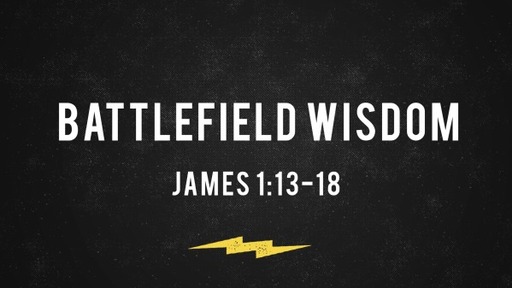Battlefield Wisdom

1. The Cause of Temptation - vs. 13-14
A Proper View of God – vs. 13 – It’s impossible for temptation to come from God.
A Proper View of Man – vs. 14
Obsession: Temptation’s Internal Source “drawn away of his own lust”
Opportunity: Temptation’s External Source “and enticed”
‘Enticed’ (deleazomenos) is an old Greek word that literally refers to luring and catching by the use of bait or a trap, like baiting a hook. The fish sees the worm covering the hook, swims around, bites it, gets reeled to the shore, is killed, cleaned and eaten! And all the while, the bait keeps us from seeing the hook! So it is with sin—it never shows us the end result of ‘taking the bait.’
2. The Process of Temptation - vs. 15-16
Conception
Good desires are easily misused and misunderstood. Eating is good; gluttony is sin. Sleep is good; laziness is sin. Work is good, but focusing on work rather than God and your family is sin. How often good things are distorted and corrupted! Lust is when desire starts taking over, and when we act on those wrong desires, sin is the result. A wise sage said: ‘You cannot help birds flying over your heads in the air, but do not let them land and build their nests in your hair.’
Sam Storms asserts, ‘The focus of Satan’s efforts is always the same: to deceive us into believing that the passing pleasures of sin are more satisfying than obedience.’ Sin is the decision or the act of disobedience. It is giving in to the temptation. While we are free to choose our actions, we are not free to decide the consequences of our actions.
So the first step is our unrestrained lust. Then James uses the interesting parallel of human conception: when we choose to obey these lusts ‘conception’ takes place. In the same way that the seed of the father impregnates the egg of the mother and a baby is conceived, so it is when our will is joined with lust. Lust conceives and has a baby: sin. R. V. G. Tasker notes, ‘Just as a child is alive before the actual moment of its birth, so sin does not begin to be sinful only when it is manifest in a specific, visible action, though some such sinful action is bound sooner or later to emerge, once the lustful thought has been entertained and cherished.’
The word ‘sin’ occurs more than 400 times in our English Bibles. But the general word ‘sin’ encompasses an ugly array of offenses toward God. Sin is ignorance (agnoema), failure to observe the laws of God (anomia), transgression (para-basis), and missing the mark (hamartia—the word used here in v. 15). We sin actively and passively—sins of commission and omission. The end result of sin is death.
Deception
The old saying is true: sin takes you farther than you want to go, keeps you longer than you want to stay, and costs you more than you want to pay. God warned Adam and Eve in the Garden that if they chose to disobey Him in the matter of eating from the forbidden tree, they would ‘surely die.’ They rebelled against God’s will and were immediately separated from Him spiritually. And ultimately they died physically. They experienced the awful reality of sin when it is ‘full grown.’ The Greek word is apotelestheisa, a compound word found only here and in Luke 13:32. It means ‘fully developed, complete in all its parts.’ Death inevitably follows when sin is fully formed, for sin from its beginning carried death within itself.
This spiritual and physical death sentence was passed to all of Adam’s progeny. Thus, when we are born, we bear the spiritual nature of Adam—separated from God and dead in our sin (Eph. 2:1–3). Paul stressed this reality in another way in Romans 6:23: ‘The wages of sin is death.’ Because we have the nature of Adam we commit acts of sin. As a boy growing up in rural South Carolina, I (Dale) often heard the older folks quip, ‘What’s down in the well comes up in the bucket.’ In other words, we sin because we are sinners by nature, and what is in our hearts ultimately reveals itself in our actions. Spiritually, we are dead in trespasses and sins if we are without Christ, and ultimately our bodies die due to the introduction of sin into the human race by our first parents, Adam and Eve. This death sentence is starkly contrasted with the crown of life promised to enduring believers in verse 12.
